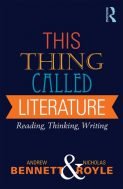
Routledge ISBN 978-1-40-825401-1
Hundreds of novels jostle on shelves, waiting to be seen to. In the corner, a ziggurat of poetry books flutters its pages. What to read? And what to make of it all?
Galloping to the rescue comes a four-legged friend called This Thing Called Literature. The double act (they refer to themselves as Bennett and Royle throughout the book) offers a breezy guide for students to reading, thinking and writing. This is not the journal to explore their many suggestive and useful ideas about literary works, great and small. However, their brief text does provide a glimpse, to the curious, of what kind of thinking goes on in literary academic circles.
As early as page three, a question mark lands in the margin as the authors blithely invoke Freud’s idea of the death drive, as if this were part of our biological knowledge. A similar kind of morbid excitement, just ten pages later, leads to a bizarre muddle about dead authors in general. Here’s the explanation for the prevalence in literature of stories about ghosts or returns from the dead: “most of the literary works that are worth reading are by dead people… There is something ghostly about literary studies, then…”.
Hence the spookiness of calculus, then, Leibniz being long gone, or the ghostly aura around J. B. Watson’s Behaviorism.
Oblivious to the countless empirical and philosophical critiques of psychoanalysis, Bennett and Royle certainly seem to be haunted by Freud. At the end of the chapter on creative writing is a reading list of eight books, five of which are about Freud. In the Glossary, the longest text is devoted to digging up, yet again, the aforementioned death drive.
It is noted, by the way, that the much shorter entry on criticism insists that it “should not be confused simply with fault-finding”. Perish the thought.
But this is an educational handbook, whose Glossary confuses the concept of the double bind with self-contradictory statements and reckons that if a poem moves you, this makes it performative. Given that “reflexivity” is a word for self-reference, why does our duo say “self-reflexivity”?
Perhaps the strangest item in the Glossary asserts that magical thinking is “the very oxygen” of literature: “there is no novel or short story that does not depend on telling the reader what a character is thinking or feeling…” Stories that do not do that can easily be found, in a few minutes, by authors such as Barthelme, Bashevis Singer, Bradbury, Hemingway, Lem, Moravia, Upward and Vonnegut.
In the section on Thinking, the team opines that thinking about literature should be rigorous, exacting and disciplined. It seems odd that two writers can’t check each other’s assertions. There is, of course, a well-known kind of double act whereby one partner can only follow, but not see, the moves of the other.
Lacunae: hiatuses in the text, moments where something appears to be missing.
Paul Taylor



